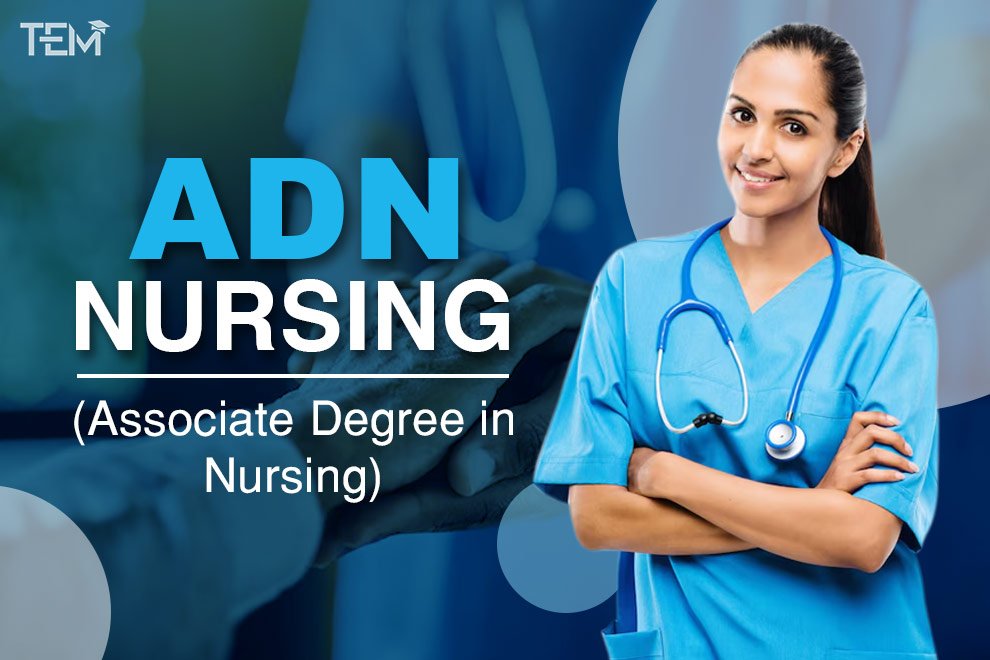Alright, let’s just dive right in and talk about nursing. It’s a field that’ll absolutely ask a lot of you – no getting around that – but wow, is it rewarding? Absolutely. Plus, let’s be real, nurses are just plain essential in the world we live in today. As you’re poking around, trying to figure out the best way to actually become a Registered Nurse (an RN), chances are the Associate Degree in Nursing, the ADN, has probably shown up on your radar somewhere. But what is this ADN nursing, really? So, could it actually be the right fit for your plans?
Instead of wading through something that feels like a dry textbook, let’s just have a real chat about it – maybe like we’re figuring things out over coffee. We’ll take on ADN nursing bit by bit. We’ll look at why tons of folks go this way, what’s actually involved in the studying part, where you could potentially land a job, and how this degree stacks up next to others in nursing. The idea here is to keep the tone clear and full of good info, sort of like that amazing teacher who just gets how to explain tricky stuff, or a seasoned pro who genuinely wants to share what they know. It’s about respecting your time and intelligence, giving you the full picture without all the extra, confusing words. That blend of knowing your stuff but also being approachable? That’s what builds real trust, and honestly, when you’re figuring out your future, especially in a field as crucial as nursing, that personal, reliable feel is exactly what you need, right?
So, ready to peek behind the curtain of ADN nursing? Let’s really get into it.
So, What’s the Deal with an ADN in Nursing?
Alright, let’s nail down the basics. An ADN, standing for Associate Degree in Nursing, is basically a college degree. You get it after finishing a specific program, usually about two years long, that’s all about getting you ready to work as a licensed Registered Nurse (RN).
Think of it as one of the main doors into the nursing world, and for a lot of folks, it’s the quickest way to snag that RN license and get straight into a healthcare job. ADN programs are typically found at places like community colleges, technical schools, and even some universities. The whole point is to give you a solid grounding in nursing ideas, hands-on patient care skills, and the sharp thinking you’ll need to look after people safely and effectively.
Once you’ve successfully finished an accredited ADN program, you’re good to go sit for the big national licensing exam, the NCLEX-RN. Pass that, and boom – you’re a practicing Registered Nurse.
Is the ADN Just a Start, or is it the Finish Line?
Now, while getting your ADN is definitely a direct way to become an RN, it really can be seen in a couple of ways: for some, it’s exactly the level of education they aimed for; for others, it’s more like a first big step. Lots of nurses kick off their careers with an ADN. Why? Well, it’s shorter and often easier on the wallet than going straight for a four-year Bachelor of Science in Nursing (BSN).
But here’s the cool part: if you decide down the road you want to go further with your education, that ADN is a fantastic starting point. You’ve already got that valuable hands-on clinical experience and a solid base of knowledge. That makes you a great candidate for what are called RN-to-BSN bridge programs. These are specially made for nurses who are already working, letting them earn their bachelor’s degree often faster than a traditional path, and often with flexible online options. So, whether you stick with the ADN or decide to add a BSN later, it’s a totally legitimate and widely respected way into registered nursing.
What Goes Into an ADN Curriculum? Building Your Nursing Know-How
Wondering what makes up an ADN program? It’s built to give you the essential smarts and hands-on ability you’ll need for those first nursing jobs. It’s a pretty focused program, packing in key science stuff and nursing practices within those couple of years.
These programs are definitely not a walk in the park – they’re challenging and demand real commitment. But they’re structured in a way that gets you moving efficiently towards actually working as a nurse.
Getting to Grips with the Science
Before you can be a great nurse, you’ve got to understand the science behind it all. ADN programs include foundational science courses, and seriously, these are super important for making sense of how our bodies work, why we get sick, and how treatments actually help. These aren’t just abstract ideas you forget after the test; they’re the ‘why’ behind pretty much everything you’ll do when caring for patients.
Think of these science courses as giving you the essential blueprint for how human health operates. They provide all the context you need for everything from checking vital signs to understanding complex lab results.
The Must-Know Science Stuff
You’ll pretty typically run into these key science subjects either before you dive into your core nursing studies or right there alongside them:
Anatomy and Physiology
This is absolutely fundamental. You’ll learn all about the structure of the human body and how its systems tick – your heart and lungs, your brain, your gut, everything. Understanding how the body should work is absolutely key. It’s like having a map – you know what the road is supposed to look like, so you can quickly see when something’s gone off course. That’s exactly what you need when a patient isn’t feeling well: spotting those signs that things aren’t right.
Microbiology
This is where you really get to explore the incredibly tiny world of things we can’t usually see – you know, bacteria, viruses, fungi, that whole crowd. You’ll learn all about how these microscopic invaders can make people sick, how our own bodies are built to try and fight them off, and why being incredibly meticulous about stuff like handwashing and keeping your environment spotless isn’t just a rule, it’s absolutely fundamental to keeping everyone, especially your patients, safe.
Pharmacology
If you become a nurse, you’ll be dealing with medications constantly. This subject is all about drugs – what they do in the body, how much to give, how to give it, and what weird or bad stuff might happen. Giving meds safely and correctly is a massive part of being a nurse, so you need to know your stuff here.
Chemistry
Often, you’ll need some basic chemistry before starting. Why? Because it helps you get a better handle on those body processes and how medications actually work at a chemical level inside us.
These science classes really set the stage for the nursing-specific courses that follow. They give you that crucial scientific base you need to truly understand patient conditions and figure out the best ways to care for them.
Pulling It All Together: Your Core Nursing Classes
Once you’ve got that science foundation, the curriculum shifts to the heart of nursing itself. This is where you focus on the principles and actual practice of looking after patients – different age groups, different health problems, different places you might work.
These core courses take all that science knowledge and turn it into practical nursing skills. You’ll learn how to check on patients, figure out what they need, and carry out plans to help them get better.
Key Subjects in Nursing Practice
Your core nursing courses in an ADN program will typically cover things like:
Moving into the heart of the program, you’ll hit the core nursing classes. This is where you really start to learn the how-to of caring for people across different ages and health situations. These subjects build on your science knowledge, showing you how to translate it into actual patient care – blending the science with the human touch that nursing is all about.
Fundamentals of Nursing
Think of this as your essential toolkit. It covers the absolute basics: how to help patients with everyday needs like hygiene and moving around safely, keeping things super clean to prevent infections (that’s your microbiology coming into play!), talking effectively with patients and their families, getting good at writing down what you do, and understanding the really important rules and ethics that guide nurses every single day.
Medical-Surgical Nursing
Often a big piece of the pie. This focuses on looking after everyday adults dealing with common illnesses or bouncing back from surgery. You’ll dig into typical diseases, standard treatments, and precisely what you, as the nurse, need to be doing to support these patients through their recovery.
Maternal-Newborn Nursing
This whole section is dedicated to caring for folks during pregnancy, right through labor and delivery, and then the time just after the baby arrives. You’ll also learn all about looking after brand-new little ones and supporting their families as they adjust.
Pediatric Nursing
It reminds you that kids are definitely not just miniature adults! This course zeroes in on the specific health needs of babies, kids, and teenagers. Caring for younger patients means understanding how they grow and develop and knowing how to approach their care in ways that really work for them.
Psychiatric-Mental Health Nursing
This subject looks at how to care for patients who are facing challenges with their mental health. A big focus here is learning how to communicate in therapeutic ways, understanding different mental health conditions, and providing genuinely supportive care.
Applied Pharmacology
Bridging science and practice, it takes all that drug knowledge you gained earlier and shows you exactly how to use it in your nursing role, making sure you’re giving medications correctly, watching carefully for how patients react, and being able to explain clearly to patients what their medications are for.
Health Assessment
Finally, this is where you master doing a complete check-up on a patient. You’ll learn how to ask the right questions about their health history and perform a thorough physical exam to gather all the crucial information you need to figure out the best plan for their care.
These courses, built on your science base, get you ready to handle lots of different situations you’ll encounter as an RN.
The Real Deal: Getting Hands-On in Clinicals
Look, you can read all the books in the world, but nursing is something you learn by doing. That’s where clinical experiences – everyone just calls them “clinicals” – are absolutely essential. These are scheduled times where you get out of the classroom and into actual healthcare places, working directly with real patients, but always with experienced nursing instructors or other RNs watching out for you and guiding you.
Seriously, clinical rotations are often the part of nursing school where things really click. They’re not just about watching; they’re your chance to practice skills, see how everything works in real life, and build your confidence while you’ve got expert support right there.
Experiencing Nursing in Action: Where You’ll Go
Your ADN program will set up clinical rotations in different types of healthcare spots. This is super important because it shows you the many different kinds of patients you might care for and the various ways nursing happens.
You’ll likely spend time in common clinical settings like:
- Hospitals
These are pretty standard clinical sites. You’ll probably rotate through various units – maybe floors for general medical patients, or areas where people are recovering from surgery. To get a feel for things often starts right in the hospitals. You’ll likely rotate through different units – maybe a floor with general medical patients, or perhaps one focused on recovery after surgery. This is where you really get a taste of that faster-paced, acute care environment, looking after folks who are quite ill or have just had procedures.
- Nursing Homes and Rehab Centers
Here, it’s common to work with older residents or individuals who are actively recovering from injuries or serious illnesses, needing steady, ongoing care and support to get back on their feet and regain their strength and independence. It’s a chance to really focus on those long-term health needs.
- Outpatient Clinics and Doctors’ Offices
Sometimes, your clinicals will happen in places like a local clinic or a family doctor’s practice. You might help out with routine check-ups, give vaccinations, or assist with less urgent health issues. The vibe here is usually quite a bit less intense compared to the constant buzz of a hospital.
- Community Health Sites.
This often involves working in spots like local health departments, maybe helping out in school nurse offices, or clinics that serve specific groups within the community. The main goal in these areas tends to be preventing illness and helping people learn practical ways to stay healthy right where they live.
- Mental Health Facilities are also common
You might spend time in a place that provides care for individuals who are navigating challenges with their mental health. A significant part of the learning here focuses on how to communicate in supportive, therapeutic ways and contribute to a safe environment for patients.
What You’ll Actually Be Doing
Just keep in mind, the exact places you go for clinicals and the specific number of hours you need to complete in each type of setting can vary a bit depending on your nursing program and the specific rules in the state where you’re studying. But no matter where you go, getting this hands-on experience is an absolutely crucial piece of getting your ADN.
But stick with the program, and you’ll find yourself gradually taking on more responsibility. You’ll start doing those patient check-ups – the assessments – yourself. You’ll get to give medications, always with a watchful eye from your instructor or a staff nurse, of course! You’ll help out with different medical procedures, begin to figure out and even help put together pieces of the patient’s care plan, and start talking directly with patients, their families, and the nursing staff you’re working alongside.
This step-by-step increase in what you’re allowed and expected to do is all carefully managed to make sure you’re learning and practicing in a way that’s totally safe for everyone involved.
Making It Official: The NCLEX-RN and Getting Your License
Okay, so you’ve finished your ADN program – huge congratulations! Now, before you actually get to wear those hard-earned scrubs on the job as a fully-fledged Registered Nurse, there’s just one absolutely vital step left. That’s successfully passing the National Council Licensure Examination for Registered Nurses – everyone just calls it the NCLEX-RN. Get past that hurdle, and then you apply for your official nursing license from the state where you’re planning to work.
The NCLEX-RN itself is a standardized exam, meaning it’s the same basic test for everyone who wants to become an RN anywhere in the U.S. Its whole purpose is to check if you can take everything you learned in your classes and clinicals and use that knowledge to make safe, sound judgments when you’re caring for real patients.
The Steps to Getting Licensed
Getting your RN license after finishing your ADN program usually follows a set path:
- Apply for Your License: First things first, you send in an application to the nursing board in the state where you want to practice. They’ll check that you’ve done everything required education-wise, including finishing an accredited ADN program.
- Register for the NCLEX-RN: You do this with a company called Pearson VUE, which runs the test. You’ll pay the exam fee when you register.
- Get Your OK to Test (ATT): Once the state nursing board says you’re eligible, Pearson VUE will send you an Authorization to Test, or ATT. Keep this safe! It has an expiration date, so you must schedule and take your test before it runs out.
- Book Your Exam Time: Use your ATT to pick a date and time to take your NCLEX-RN at an official Pearson VUE testing center.
- Take the Test: Head to the testing center on your scheduled day and take the exam. It’s a computer test that adapts as you go.
- Find Out How You Did & Get Your License: Your state nursing board will let you know your official results. If you passed, they’ll issue your Registered Nurse license!
Passing the NCLEX-RN is a big deal and shows you’re ready for entry-level nursing. You’ll need to study hard, building on everything you learned in your ADN program and clinicals.
What Kind of Jobs Can You Get with an ADN?
Once you’ve got your ADN and that RN license in hand, suddenly, lots of doors swing open in the healthcare world. Nurses who started with their ADN are absolutely crucial members of healthcare teams in all sorts of places.
And here’s some good news: the need for Registered Nurses isn’t going anywhere; in fact, it’s expected to grow. The U.S. Bureau of Labor Statistics (BLS) predicts that between 2022 and 2032, jobs for RNs will likely grow by 6%, which is faster than the average for most other jobs. That means, generally speaking, things look pretty good for ADN graduates looking for work.
Places Where Your ADN Can Take You
Nurses with an ADN work in all kinds of spots, offering different vibes and chances to learn. You definitely won’t be limited to just one type of workplace.
Some common places you’ll find ADN-prepared RNs include:
- Hospitals: A very typical place to work. You could be on a general medical floor, a surgical unit, or maybe even in some more specialized areas, depending on the hospital and if you get extra training. You’ll be looking after patients who are acutely ill or recovering from procedures.
- Nursing Homes and Long-Term Care: These places need nurses to provide ongoing care for older residents or those with long-term health issues, helping with daily needs and managing chronic conditions.
- Doctor’s Offices and Clinics: Here, you might help doctors with exams, give shots, handle medications, and teach patients about their health. It’s often a bit less intense than a hospital.
- Home Health: You could be providing skilled nursing care right in patients’ homes, helping them manage their health and recover in a familiar setting.
- Rehabilitation Centers: These facilities help patients get back on their feet after things like strokes, injuries, or major surgery. You’ll be part of the team helping them regain strength and independence.
- Community Health: This involves working out in the community, maybe in a local clinic, a school, or a public health department. The focus is often on keeping populations healthy and preventing illness.
- Outpatient Surgery Centers: You’d care for patients having minor surgeries who don’t need to stay overnight in a hospital.
- Correctional Facilities: Nurses are needed to provide healthcare services to people who are incarcerated.
- Schools: As a school nurse, you’d handle basic healthcare needs for students, manage chronic conditions like asthma or diabetes, and promote overall wellness in the school community.
Having so many different options means you can often find a place to work that really fits your personality and what you enjoy doing.
What a Typical Day Might Look Like
The exact things you do as an ADN-prepared RN can vary a lot depending on where you work. But there are core duties that come up frequently:
- Checking on patients, listening to them, and noting down how they’re doing.
- Giving medications and treatments exactly as the doctor ordered.
- Keeping an eye on vital signs and being sharp enough to notice if something’s changing for the worse.
- Working on and following plans for how to care for patients.
- Talking with patients and their families about their health, their medications, and what they need to do to take care of themselves.
- Teamwork! Talking and planning with doctors, physical therapists, and all the other folks involved in a patient’s care.
- Doing things like changing wound dressings.
- Using and monitoring medical equipment.
- Making sure all the patient’s records are accurate and up-to-date.
ADN nurses are right there on the front lines, doing the crucial work of looking after people and helping them get better and stay safe.
ADN vs. BSN: Figuring Out the Differences
When you’re looking into becoming a nurse, you’re definitely going to hear about both the ADN and the Bachelor of Science in Nursing (BSN). Both degrees get you to that same point – being a licensed RN, doing many of the same basic nursing tasks. But they’re not exactly the same; they differ in how long they take, what you study in detail, and where your career might head in the long run.
Getting a clear picture of these differences is pretty important, so you can pick the path that makes the most sense for you right now.
A Side-by-Side Look
Let’s stack up the ADN and the BSN:
How Long They Take: The most obvious difference. An ADN usually takes about two years if you go full-time. A traditional BSN? That’s typically four years. So, the ADN gets you into the working world faster.
What You Study (How Deeply)
Both degrees cover essential nursing stuff and skills. But BSN programs add more coursework. You’ll study things like nursing theory (the big ideas behind nursing), research (how we know what works best), leadership, community health (looking at health beyond just one person), and sometimes even management. It gives you a wider view of healthcare and the nursing world.
Job Opportunities and Moving Up
ADN nurses have plenty of job options, no doubt. But increasingly, some places, especially bigger hospitals or those with special recognition for nursing excellence (called Magnet status), really prefer or even require nurses to have a BSN. If you want to move into leadership roles (like being in charge of a unit), teaching nursing, doing research, or getting into certain specialized nursing areas, a BSN is often a must. And if you ever want to get a master’s or a doctorate in nursing? A BSN is pretty much always the entry ticket.
What About Pay?
Starting out, the pay for ADN and BSN nurses can sometimes be pretty similar, depending on where you work. But over a whole career, nurses with a BSN often tend to earn more. Why? Because a BSN can open doors to jobs with higher salaries and more opportunities to climb the career ladder. For example, data from sources like the BLS and studies shared by the American Nurses Association often show a noticeable salary difference, sometimes adding up to hundreds of thousands of dollars over a career. Also worth noting: NCLEX-RN pass rates can be slightly higher for BSN graduates compared to ADN graduates on the first try, according to bodies like the NCSBN, although ADN pass rates are still generally strong.
What Employers Are Looking For
Healthcare places are increasingly trying to have more BSN-prepared nurses on staff. Research seems to suggest a link between having more nurses with bachelor’s degrees and better results for patients. It’s a growing trend in the industry.
Honestly, it’s not really about one being definitively “better” than the other across the board. It truly depends on your situation, what you want to do long-term, and how you prefer to learn.
Why an ADN Could Be a Great First Step for You
Lots of people choose the ADN path, and there are some really solid reasons why:
- Get Working Sooner: Finishing a two-year program means you can become a licensed RN and start your nursing career relatively quickly. You begin gaining experience and earning a paycheck much sooner than if you went for a four-year degree right away.
- Less Expensive Upfront: Generally speaking, ADN programs, especially those at community colleges, tend to have lower tuition fees than university BSN programs. This can mean less student debt hanging over your head.
- Focus on Practical Skills: If you’re someone who learns best by doing and you’re keen to get straight into the hands-on side of patient care, ADN programs often have a strong focus on building those essential clinical skills from the get-go.
- Flexibility for Later: Starting with an ADN gives you the chance to work as an RN and get real-world experience. Then, if you decide you want that BSN for more opportunities, you can often enroll in an RN-to-BSN program while you’re already working, balancing your education with your job. Many employers even help pay for it!
If getting into the nursing field fairly quickly and affordably is a high priority for you, and you’re ready for a program that jumps into the practical side, the ADN is definitely a very good option to consider.
Things to Keep in Mind
Going into an ADN program is a smart move for many, but it’s also wise to be aware of a few things that might come up:
- Some Jobs Might Prefer a BSN: Just being realistic, you might find that some hospitals, particularly the big teaching ones or those going for Magnet status, really lean towards hiring nurses with a BSN. It’s not everywhere, but it’s a trend in the industry.
- Certain Career Goals Need More School: If your dream job down the line involves being a nurse manager, teaching nursing at a college, doing nursing research, or becoming an advanced practice nurse (like a Nurse Practitioner), you’ll almost certainly need a BSN as a minimum, and probably a master’s or doctorate later.
- It’s Intense: Even though it’s shorter than a BSN, an ADN program packs a lot of demanding coursework and clinical hours into those two years. You’ll need good time management and a lot of dedication to keep up.
But remember, many ADN nurses successfully deal with these points by getting some good experience and then doing those flexible RN-to-BSN programs while they’re working. Lots of places even offer money to help you pay for it!
Don’t Skip This Part: Program Accreditation
This is absolutely non-negotiable. If you’re looking at an ADN program (or any nursing program, really), you must make sure it’s accredited by a recognized nursing accrediting body. In the U.S., the main ones are the Accreditation Commission for Education in Nursing (ACEN) and the Commission on Collegiate Nursing Education (CCNE).
Think 1 of accreditation as a stamp of approval. It means the program has been checked out and meets strict quality standards for what they teach, who’s teaching it, their facilities, and how they do clinical training. Going to an accredited program is critical for several big reasons.
Why Checking for Accreditation is a Must
- You Need It to Get Your License: Pretty much all state boards of nursing require you to graduate from an accredited program before they’ll let you even take the NCLEX-RN exam and get your license.
- It Affects Financial Aid: If you need federal student grants or loans to help pay for school, you’ll generally only get them if you attend an accredited institution and program.
- Transferring Credits Later: If you decide to go back for your BSN or another degree, accredited programs are way more likely to accept credits you earned at another accredited school. Credits from unaccredited programs often don’t count.
- Employers Look For It: Many healthcare employers specifically look for or even require that their nurses graduate from accredited programs. It assures them you got a quality education.
- Ensuring a Good Education: Accreditation means the program is meeting quality benchmarks for what they teach and how they teach it, making sure you’re getting the right education to be a competent and safe nurse.
Seriously, before you apply or pay any money, double-check the program’s accreditation status. It’s one of the most important things you can do to protect your investment in your education and your future career.
What Comes After the ADN? Your Career Can Keep Growing
Getting your ADN and becoming a licensed RN is a fantastic achievement and a strong start to a really rewarding career. But for many nurses, the learning and professional growth don’t stop there. The world of medicine and nursing is always changing, with new knowledge, technologies, and ways of caring for patients popping up all the time.
Continuing to learn is just part of being a nurse, and there are lots of ways for ADN-prepared RNs to build on their skills, learn new things, and open up more career doors.
Ways to Grow and Specialize
- Go for Your BSN: This is probably the most common next step if you want to advance. RN-to-BSN programs are set up for nurses who are already working, adding in courses on things like leadership, research, and community health. Getting that bachelor’s degree can really boost your job options and earning potential.
- Get Certified in a Specialty: Once you’ve worked for a while and found an area you really like (like working with kids, older adults, or in the emergency room), you can get special certifications. This shows you have extra knowledge and skills in that specific area and can make you more valuable to employers, maybe even leading to a bit more pay.
- Gain Experience and Move Up Within a Facility: Simply by working hard, learning, and showing leadership qualities, you can often move into roles like being a charge nurse on a shift or helping to train new nurses right where you work, even if you don’t have a BSN yet.
- Look Towards Graduate School: If you eventually want to become a Nurse Practitioner, a nurse educator in a college setting, or work in advanced clinical roles, you’ll need a master’s or doctoral degree. While a BSN is usually required to get into those programs, there are sometimes bridge programs for experienced ADN nurses.
Putting in the effort for more education or certifications after your ADN can definitely have a big, positive impact on how far you go in your nursing career and how much you earn.
What’s the Job Market Like for ADN Nurses?
Good news here: the job market for Registered Nurses, including those who started with an ADN, is expected to stay strong. As people live longer and need more healthcare, and as many experienced nurses retire, there’s a consistent need for qualified RNs across the country.
While it’s true that some employers, particularly certain hospitals, might prefer nurses with a BSN these days, there are still lots of job openings for ADN graduates. Places like nursing homes, rehab centers, clinics, and home health agencies actively hire ADN-prepared nurses. And many hospitals still hire them too, though the number of BSN nurses working in hospitals has been increasing over the years.
Talking About Salary
How much you’ll earn as an ADN-prepared nurse can vary quite a bit. Things like where you live, the type of place you work (is it a big hospital or a small clinic?), how many years you’ve been a nurse, and any extra training or certifications you have all play a part. The U.S. Bureau of Labor Statistics reports a median annual wage for all Registered Nurses, but remember that includes nurses with different degrees and experience levels.
Generally, while nurses starting with an ADN ($60,000) and a BSN ($70,000) might have similar initial pay in some places, nurses with a BSN tend to see higher earning potential over their careers. This is often because they have access to more advanced or leadership roles that come with higher salaries. Data often highlights this salary gap, showing that the extra time in school for a BSN can pay off financially over the long run. But boosting your education and getting certifications are definitely ways ADN nurses can increase their earning power, too.
Could an ADN Be Your Starting Line?
Deciding on your path into nursing is a big deal. The Associate Degree in Nursing offers a clear, relatively fast, and often more budget-friendly way to become a licensed Registered Nurse. It gives you the essential knowledge and hands-on skills you need to step into a crucial role in healthcare.
If you’re keen to get your nursing career started, want to gain real-world clinical experience early on, and are ready for a focused, demanding program, pursuing an ADN could be an excellent fit for you. It opens up lots of job opportunities and can also be that important first step if you decide you want to go further with your education down the road. Take some time to look into accredited ADN programs that seem like a good fit, check out what the job market looks like where you want to work, and think about how the ADN fits with your bigger plans. Becoming a nurse is a commitment to caring for others, and an ADN can be a really strong way to begin that journey.
Also Read: iDesign Helps Nursing Schools Harness Technologies to Scale Innovative Programs










